Which Commercial Drain Openers are Safe for Pipes?
Which Commercial Drain Openers are Safe for Pipes?
When you know you’re dealing with older pipes, you might be concerned about using chemical drain openers when drains slow down or back up. It would be one thing in a brand-new building, but as your facility ages, it’s reasonable to worry that chemical drain care may do you more harm than good.
At State Chemical, we manufacture and distribute biological and chemical solutions for various applications, including drain care. We understand that chemical drain products can be a little intimidating what with their grocery list of instructions and warnings, especially as you’re already trying to fix a problem.
To help you understand whether chemical drain openers are the right choice for your facility, we will explain what types of pipes are at risk of harm from which drain openers and alternative maintenance options. After reading, you’ll know what treatment option will be safest for your pipes.
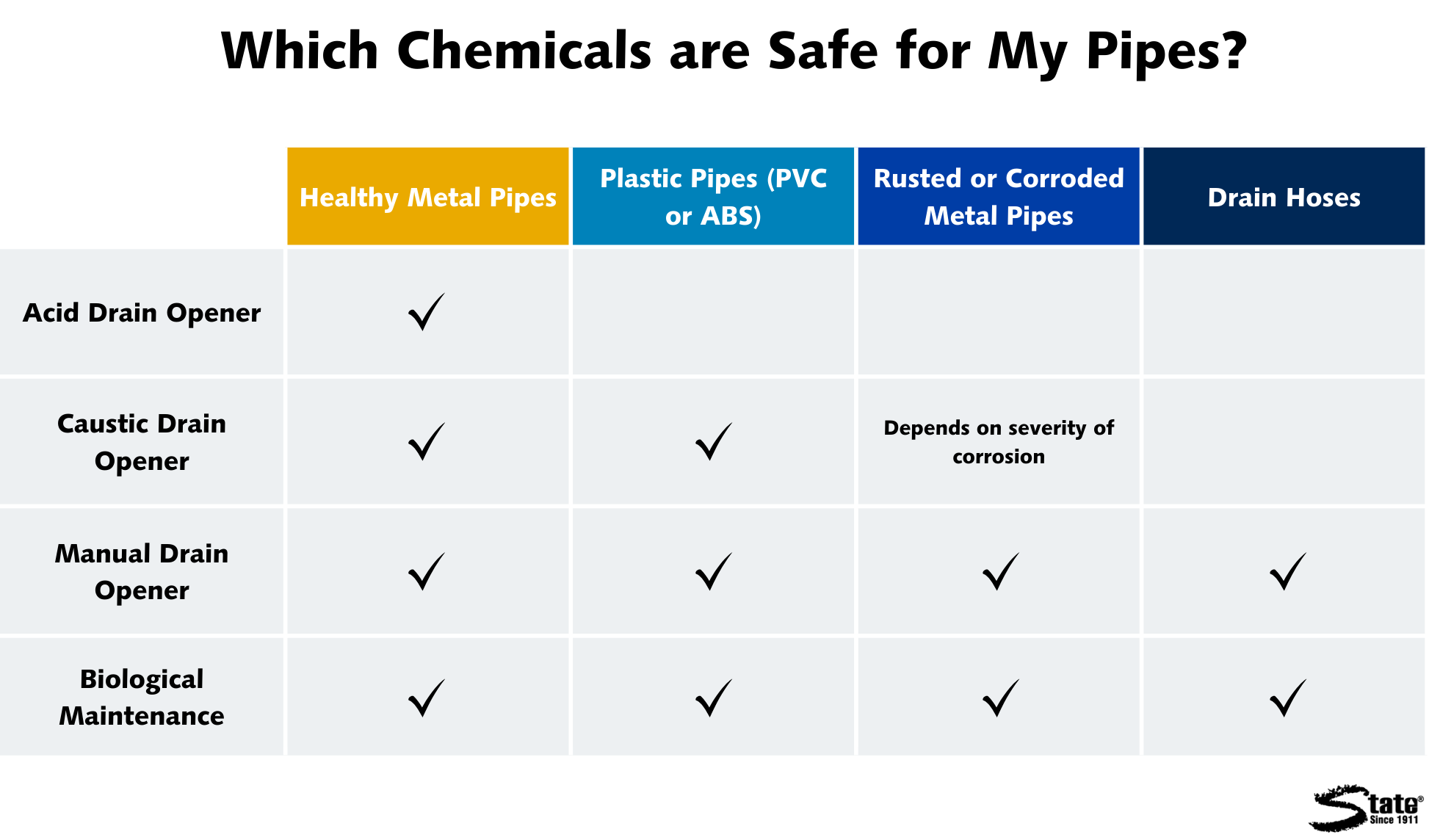
What Pipes May Be Damaged by Commercial Drain Openers
Any drain opener should work without issue when used on the correct piping. To determine if a drain opener is safe for your drain, don’t consider the chemical—consider first what type of piping you have.
Healthy Metal Pipes
If your building was built before 1980, you likely have metal pipes. They may or may not be facing deterioration based on their age and condition, so ensure that they’re in good shape before adhering to the following guidance. If you find that your pipes are facing any signs of deterioration, follow instead the guidelines for corroded or rusted metal pipes.
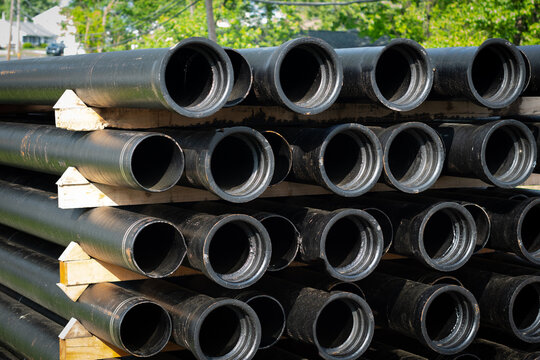
For metal pipes in good condition, virtually any drain opener should be safe to use. This includes acids, caustics, and other chemicals.
Keep in mind that repeated use of drain openers over a short timeframe can cause damage to your pipes regardless of their condition. Be cautious about the overuse of drain openers, but when used responsibly, they should cause no damage to healthy metal pipes.
Corroded or Rusted Metal Pipes
Meanwhile, if your building was built before 1980 but the pipes have shown clear signs of deterioration, you likely have corroded or rusted metal pipes. In this situation, you will need to follow different protocols.
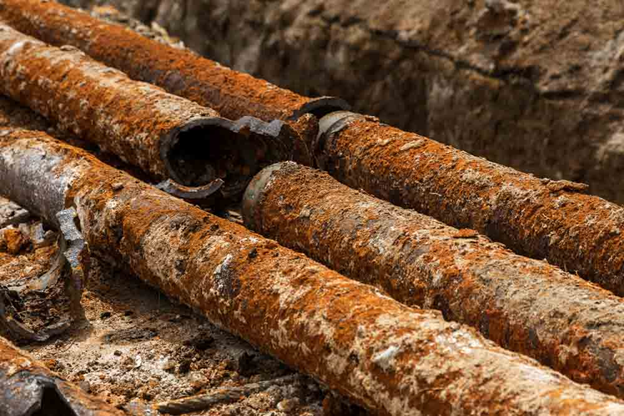
Metal pipes are likely to experience rusting or corrosion over time as they age, especially if they aren’t treated with preventative drain maintenance. This is a normal part of pipe aging affected by environmental factors such as moisture, soil composition, and water chemistry.
Unfortunately, this severely weakens your pipes and reduces the amount of pipe space available due to swelling. When this happens, rust or corrosion can spread throughout the entire pipe, meaning the entire pipe could be composed of rust.
This said, you should not use acid on a corroded or rusted pipe. It will eat through the corrosion in the same way that it eats through drain clogs, exposing weak spots in your plumbing and opening holes. You can imagine how a badly rusted pipe could be quickly worn down by such an intense chemical.
Similarly, heat-generating caustic drain openers can further wear down corroded pipes over time. Depending on your level of damage, it may not be advisable to use heat-generating caustics either. If you have concerns, contact the chemical manufacturer—and it’s time to instead consider pipe replacement if your issue is severe.
Plastic Pipes, Including PVC and ABS
If your building was built after 1980, you likely have plastic piping, such as PVC or ABS. When dealing with plastic pipes, you won’t have to worry about corrosion, but you will have to consider the material itself.
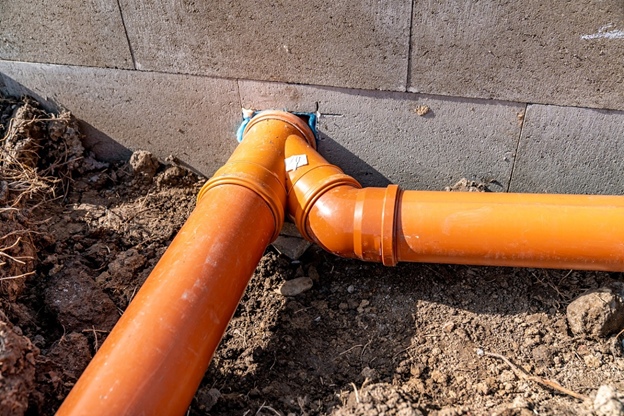
For plastic piping, it’s usually safe to use heat-generating caustic drain openers. However, if overused, these caustic drain openers will wear down and potentially even melt through the pipes because of the heat they generate.
For this reason, if your drain problems continue after using the recommended amount of a caustic drain opener, do not use more product. Instead, call a plumber. But for general usage, heat-generating caustics are usually safe for plastic piping.
Additionally, it is usually not recommended to use acids on plastic piping. Acids pose the risk of melting through plastic pipes, especially when used frequently. If you’re in a situation where heat-generating caustics aren’t working, don’t turn to acids. Instead, as above, call a plumber.
Drain Hoses
Chemical drain openers are not intended to be used with drain hoses. If you use an acid or a caustic in a setting composed of rubber or polyurethane, these materials will melt. When dealing with drain hoses, it’s best to explore non-chemical options.
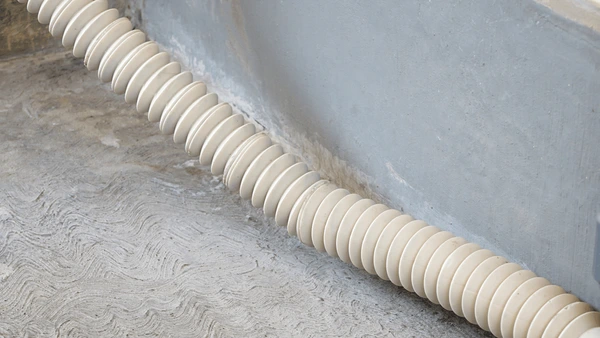
Chemical-Free Ways to Maintain Your Drains
If using caustics or acids on your pipes seems risky, you have several alternative treatment options. Depending on your specific issue, you should explore the following:
Manual Drain Maintenance
If you’re dealing with pipes at high risk of chemical damage, it’s a good idea to look into manual drain maintenance, like drain snakes or services provided by a plumber.
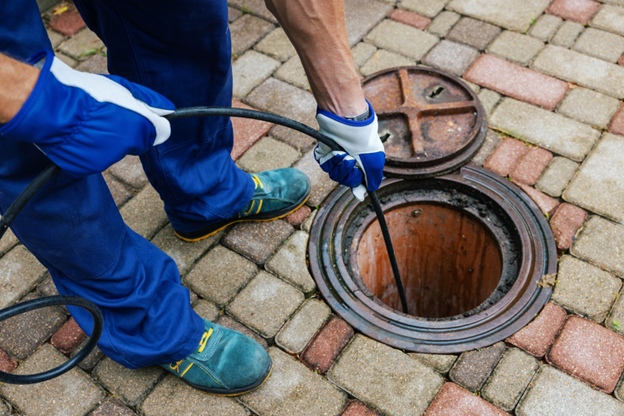
In the case of corroded pipes, manually removing the corroded material may yield more effective results than chemicals, which could cause more damage than anything else. Similarly, with plastic pipes and drain hoses, you can eliminate the risk of melting by simply using a manual opener for clogs rather than a chemical.
Even then, a manual opener can’t solve every situation, but if you’re worried about the state of your pipes, it might be a good idea to try a manual opener before moving on to heavy-duty options.
Biological Drain Maintainers
If you are dealing with buildup rather than a clog, biological drain maintainers are another feasible option.
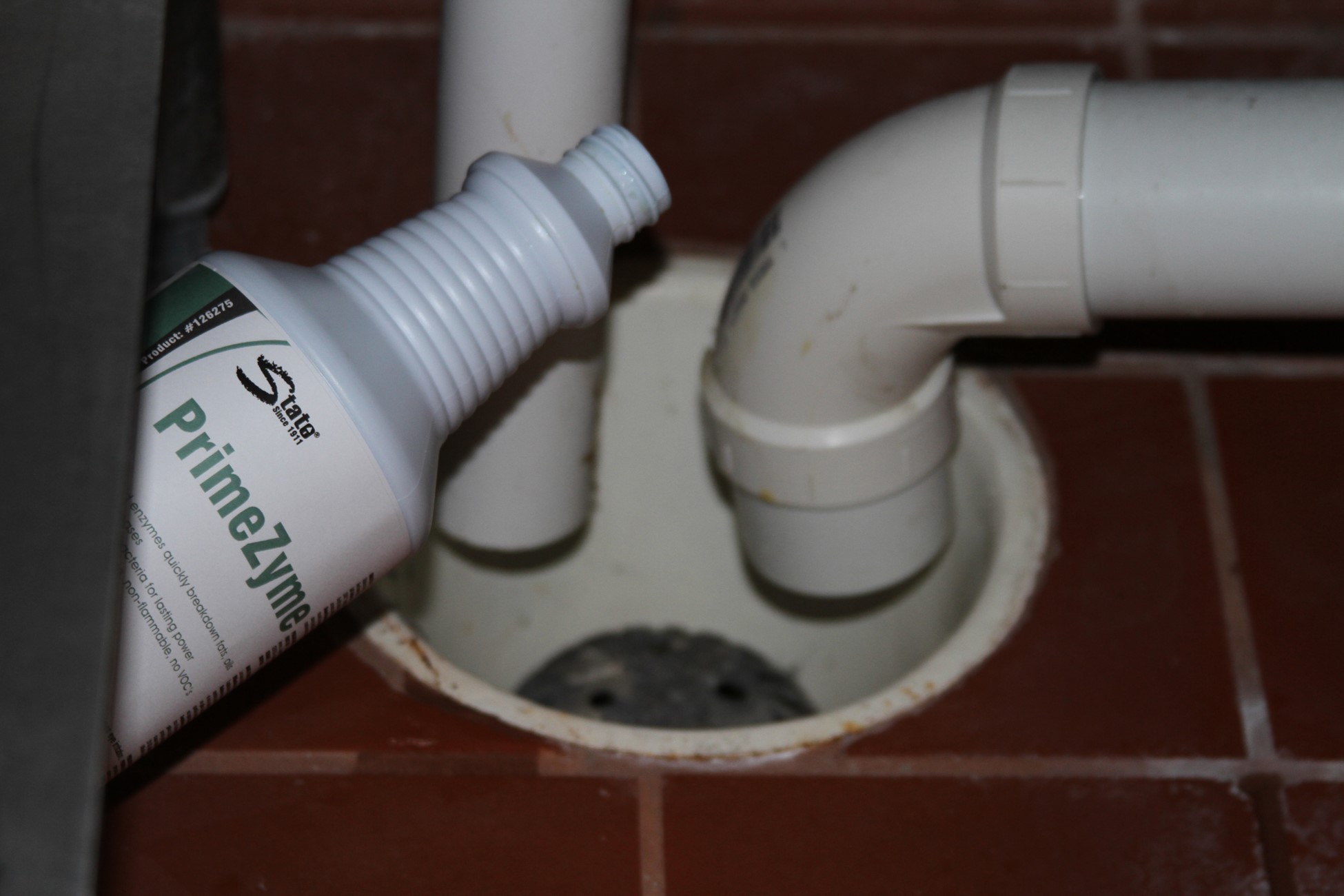
Composed of bacteria, biological drain maintainers function by releasing “good” bacteria into your drain. These “good” bacteria then digest organic buildup into water and air. Biological drain maintainers pose no risk to pipe health and are even considered safer for the user since they cannot cause chemical burns or fumes.
An important note is that biological drain maintainers will not break down rust buildup or corrosion, but they can prevent organic buildup from further blocking pipes, including corroded pipes. They are not a permanent solution if your pipes are already worn down, but if your pipes are simply the wrong material for harsh chemicals, biologicals can be a great way to prevent clogs and other future issues.
Reline or Replace Metal Pipes
If you’ve explored option after option and your pipes are just in such bad shape that they can’t handle the severe intervention they need, it may be time to replace your pipes. There are many maintenance methods you can try, but at a certain point, there’s nothing more you can do.
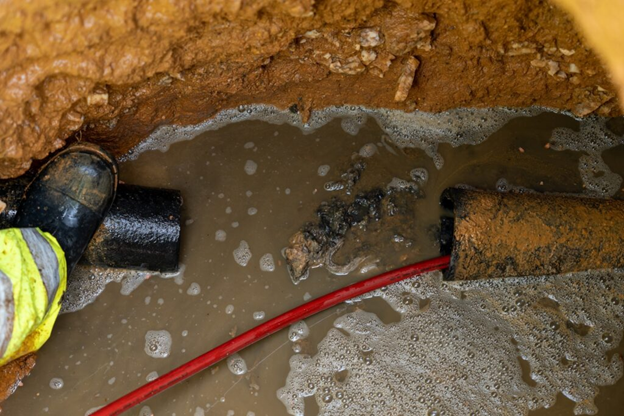
Depending on your issue’s severity, you may be able to reline your pipes rather than fully replace them. This is an effective way to prevent continued corrosion and keep your pipes in functioning order.
If relining isn’t possible, biting the bullet and replacing your pipes will be worth the headache once you have functioning drains again. Pipes aren’t meant to last forever, so if there’s nothing left to be done, replacement is your only option.
Learn Which State Chemical Commercial Drain Opener is Right for You
It’s valid to be concerned about chemicals harming your pipes—after all, there can be different risks depending on pipe type and chemical type. Now that you understand which treatment method is best for your situation, read this article to learn which State Chemical commercial drain opener is right for you.








